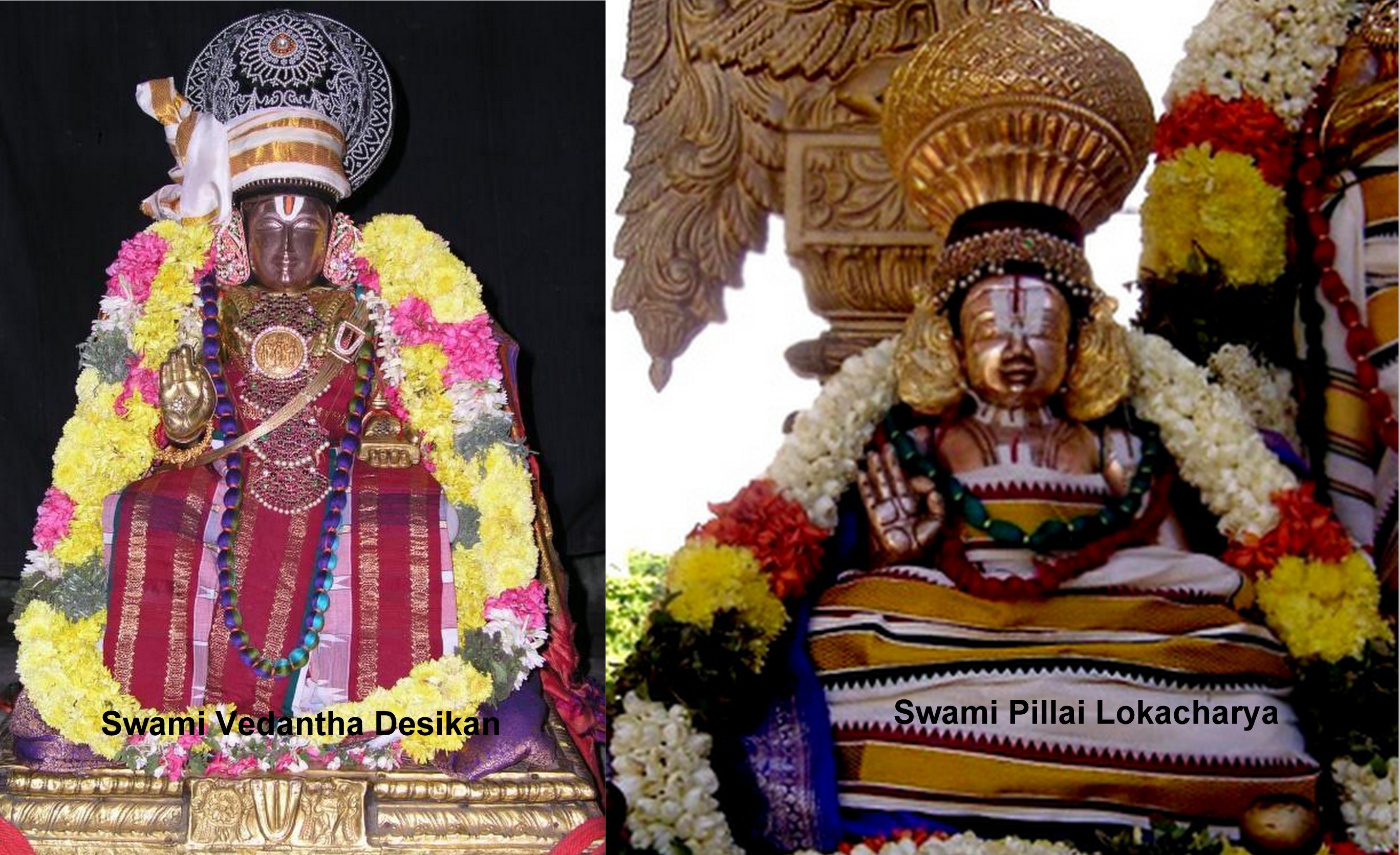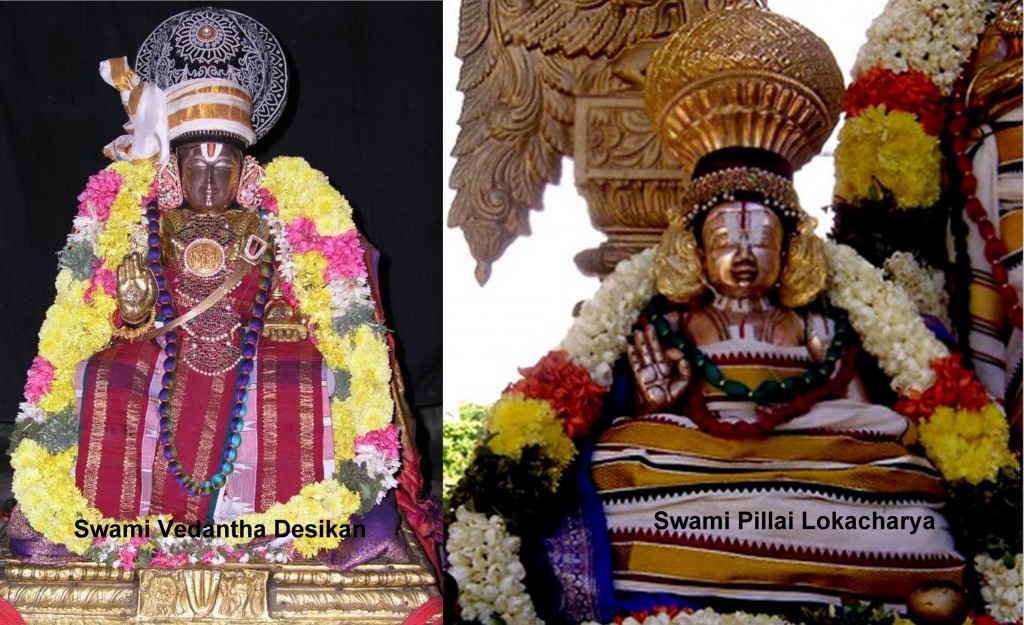Chapter 13: Vadakalai and Tenkalai
1. We have got two sects, Vadakalai and Tenkalai. What is the difference between these two schools of thought?
There is no fundamental or basic difference in the philosophy, between the two schools, Vadakalai and Tenkalai. There is only difference of opinion on some issues. These are not significant.
2. When did this division, Vadakalai and Tenkalai actually take place?
We cannot say for sure. There were differences of opinion, on some minor issues. In due course, these developed into two separate schools of thought, called Vadakalai and Tenkalai.
The differences are more academic in nature. Each school stresses importance on some aspects. The minor differences of opinion arose, because of the degree of emphasis laid on some points, by each school. These minor differences need not be given importance.
3. Please tell me some of the more important differences of opinion, between the two schools.
The first one is about, the position and nature of Lakshmi. The principle of Vadakalais is as follows:
1) Goddess Lakshmi has three characteristics.
i) The first one is her recommending and pleading role to Lord Narayana on behalf of the Jivatma. (Purushakara).
ii) The second one is that she is herself the means for attaining salvation, just as Narayana is the means for attaining salvation (upaya).
iii) The third characteristic is that, she is also the object of attainment (upeya). In Sri Vaikunta, she and Narayana are served by the chetanas or Jivatmas after attaining moksha.
2) Lakshmi is Paramatma (along with Narayana); and is not Jivatma.
3) Lakshmi is also infinite in nature (vibhu), like Narayana.
4. How does the Tenkalai view point differ from the above Vadakalai view point?
The Tenkalais accept Lakshmi’s role as a mediator, i.e. her recommendatory nature. They also accept that she, along with Narayana, is the object of attainment, in Paramapada.
But they do not accept the principle that she is also the means of attaining salvation; i.e., that she is also an upaya.
2) They say Lakshmi is a Jivatma.
3) Lakshmi is atomic in nature.
5. What about Kaivalya?
Yes,Another point of difference is about the status of the Jivatma who attains Kaivalya. Those who have performed Jnana Yoga perceive and enjoy their own souls. This is called Kaivalya.
4) Vadakalai school holds that Kaivalya is inferior to Paramapada or Moksha. It is not eternal; and the soul finally reaches Paramapada. So Kaivalya, according to the Vadakalai school, is situated outside Sri Vaikunta.
The Tenkalai school also accepts that Kaivalya is inferior. But they state that these souls enjoy Kaivalya eternally in the Paramapada or Sri Vaikunta only, in the outer most parts.
6. What about bhakti and prapatti?
5) The Vadakalai school accepts both bhakti and prapatti as the means for attainment of moksha.
The Tenkalai school does not accept bhakti as a means or upaya. They state that accepting or adopting bhakti yoga as a means is against the nature of the dependent soul. The soul is absolutely dependent on the Lord. So, he should not, by himself, adopt bhakti yoga.
7. What about prapatti?
6) The Vadakalai school states that prapatti has to be a positive, specific act of surrender, by the Jivatma to the Lord.
The Tenkalai school does not consider that a positive act of surrender is necessary. They say that i) knowledge of the essential nature of the Jivatma, and ii) mental acceptance (non-rejection) on the part of the Jivatma to Iswara granting him salvation, are required. So the Jivatma need not specifically adopt any means for salvation, as a positive act. He may, however, do good things and service to God, for the pleasure of the Lord.
8. What about the point of getting the Lord’s grace (Kripa)?
7) The Vadakalai school holds that a positive effort is necessary, on the part of the Jivatma to attain the Lord’s grace.
The Lord can be accused of partiality or unkindness, if He gives moksha to some and not to others. Further, the Lord cannot grant moksha to all people.
So, the Vadakalai school says that the Lord’s grace has to have some reason, like the efforts by the individual soul.
The Tenkalai school says that the Lord’s grace (kripa) is spontaneous. He grants moksha to those whom He likes.
The Vadakalai philosophy is compared with the practice of the monkey (markata nyaya). In the case of a monkey, the child must cling or attach itself to the mother. Similarly, the Jivatma has to make some efforts to gain Lord’s grace.
The Tenkalai school is compared to the cat system. In the case of a cat, the mother cat holds the child cat, in its mouth and moves about (marjara nyaya). Similarly, Tenkalai school states that it is the Lord, who grants favours to those, whom He likes.
9. What is the next point of difference?
The next difference is the Lord’s attitude towards the sinners.
8) The Tenkalai school states that the sins of a devotee are pleasing to the Lord; just like the dirt in the wife’s body is pleasing to the husband; or the dirt in the calfs body is pleasing to the mother cow.
The Vadakalais say: The Lord ignores or does not see the sins of the devotee.
In the examples given, the husband or the mother cow does not hate the wife or the calf, respectively, because of the dirt. The dirt however is in due course cleaned. Similarly, the sins of a devotee are not seen by the Lord.
10. What about performance of compulsory duties?
Yes, another point of difference is about performance of compulsory duties, like Sandhyavandana and others.
9) The Tenkalai school holds that for an exalted person, who is ready to receive the Lord’s grace,it is not an offence to give up the performance of these compulsory duties.But they do these compulsory duties, so as to set an example to ordinary persons; because, following the example of such great personalities others also should not give up their performance of compulsory duties.
The Vadakalai schools holds that the performance of compulsory duties has been laid down by the sastras. So, these have to be done as laid down, by all persons. Non-performance of these is a sin, which will attract God’s punishment.
11. What about the interpretation of charama sloka?
10) The Tenkalai school holds that in the first part in the charama sloka, “giving up all the dharmas” means that, all dharmas must be given up first, before seeking refuge in the Lord.
The Vadakalai school states that these dharmas actually refer to the different vidyas, in the bhakti yoga. These vidyas have already been given up by the Jivatma, due to his inability; and that this is a statement of fact.
12. How do they interpret the Lord’s compassion (daya)?
11) The Tenkalai school states that the Lord also grieves when a person is suffering.
They quote the authority from Ramayana, where it is said that Rama becomes grief-stricken at the sorrow of human beings.
The Vadakalai school says: A person has to feel sorry, for somebody’s grief, only if he is not able to remove the grief of the other person. When a person has the capacity to remove another man’s grief, there is no need for him to feel sorry. He will remove the other man’s grief.
Similarly, the Lord has got the powers to remove a person’s grief. So, there is no need for Him to feel sorry. He will remove the grief of the humanbeing.
It is stated in Ramayana, that Rama was feeling sorrow at the people’s sorrow for two reasons:
1) Good people who see that in the avataras, like Rama or Krishna, He also feels sorry, develop further affection towards Rama or Krishna and thus do good deeds.
2) Bad, or wicked people, seeing the Lord also grieving, think that He is also a human being like themselves; and thus, do wicked things and suffer.
13. What is meant by saying that the Lord is present Everywhere?
The Vedas say that the Lord is smaller than the smallest; and is bigger than the biggest. The Lord is present everywhere.
12) The Vadakalai school states that the Lord’s being inside an atom means that the Lord is present even in an atom. Similarly, when it is stated that the Lord is bigger than the biggest, or, infinite; this means that the. Lord is also there, wherever such infinite things like Time are.
I have already explained these aspects earlier,as antar vyapti and bahir vyapti.
The Tenkalai school states that the Lord is also inside the atom and similarly He also envelops the infinite things, like Time, because of His special powers.
14. Are these 12 the only points of difference between the two schools?.
Actually, there are 18 points of difference, but these are the more important.
I have only very broadly dealt with the points of difference, without going into details. As I already stated, the differences are more academic in nature and minor. They are not significant. Each school lays emphasis on certain aspects.
Sri Desika has also mentioned as follows: Among Sri Bhashyakara’s (Ramanuja’s) disciples, there are no differences on essential points. There are only differences in interpretation.
To be continued…
Source: A Dialog on Hinduism By Sri V.N. Gopala Desikan









